Should Puppies Sleep in the Dark? [MUST Know]
The thrill puppies give to adults and children, male or female, is one of a kind, and it’s very similar to the joy a newborn baby brings to the family. Now, there’s a thing called ‘Puppy Joy’ which is the aftereffect of buying a puppy or having your dog put to bed and bringing a cute little pup into the world.
In that feeling of excitement, you probably vow to provide the best possible environment for the cute, fragile puppy to grow in, as you want your pup to grow healthy and strong.
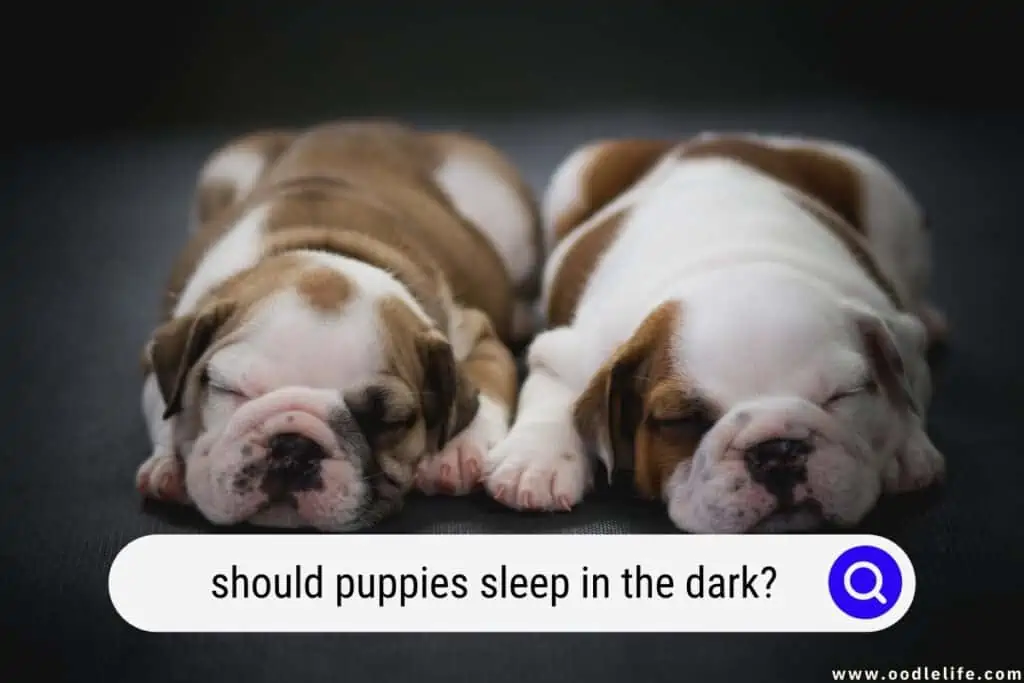
By that token, it is not uncommon for questions like what food is best and healthy for your pup to come up. Where should I keep my puppy? In a cage or a crate?
Where should my puppy sleep? Should they sleep with or without light? With or without sound?
To pop up in your mind now and then.
In this article, you will find out the best conditions for your pup to get good sleep and more, so pet lovers, pup owners, let’s get right to it.
Can My Puppy Sleep in the Dark?
The answer to that is an ironclad yes!
Dogs can most definitely sleep in the dark at night. But is that a requirement for a puppy to sleep? Well, not necessarily.
Dogs can sleep in the dark mainly because they have been living with humans for ages and have now adapted to human sleep patterns. Although dogs sleep longer than humans, about 12–16 hours a day, this proves that dogs do not necessarily need darkness to sleep.
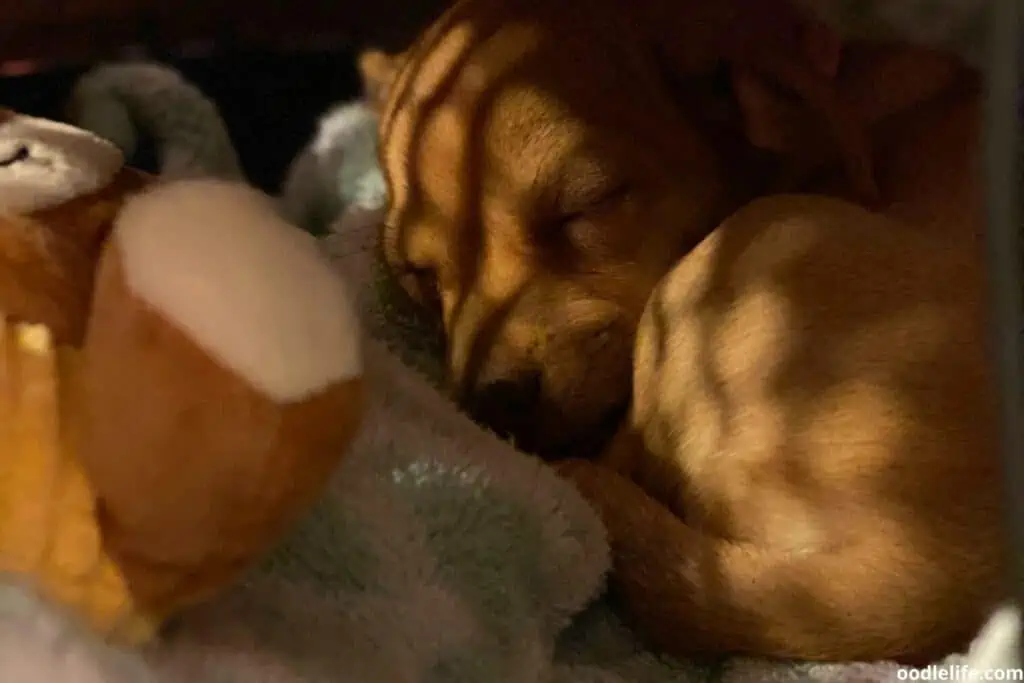
Should My Puppy Sleep with the Night Lights On or Off?
Since dogs can sleep during the day and in the dark, which might vary between dogs, it’s up to you to find out when your dog sleeps better, whether with dim night lights, full night lights, or no light.
If your puppy sleeps better with the light on, then let it sleep with the lights on. If it sleeps better with dim light, you should let it sleep with a dim light. If it sleeps better with no light, then do not put on the light so it sleeps well.
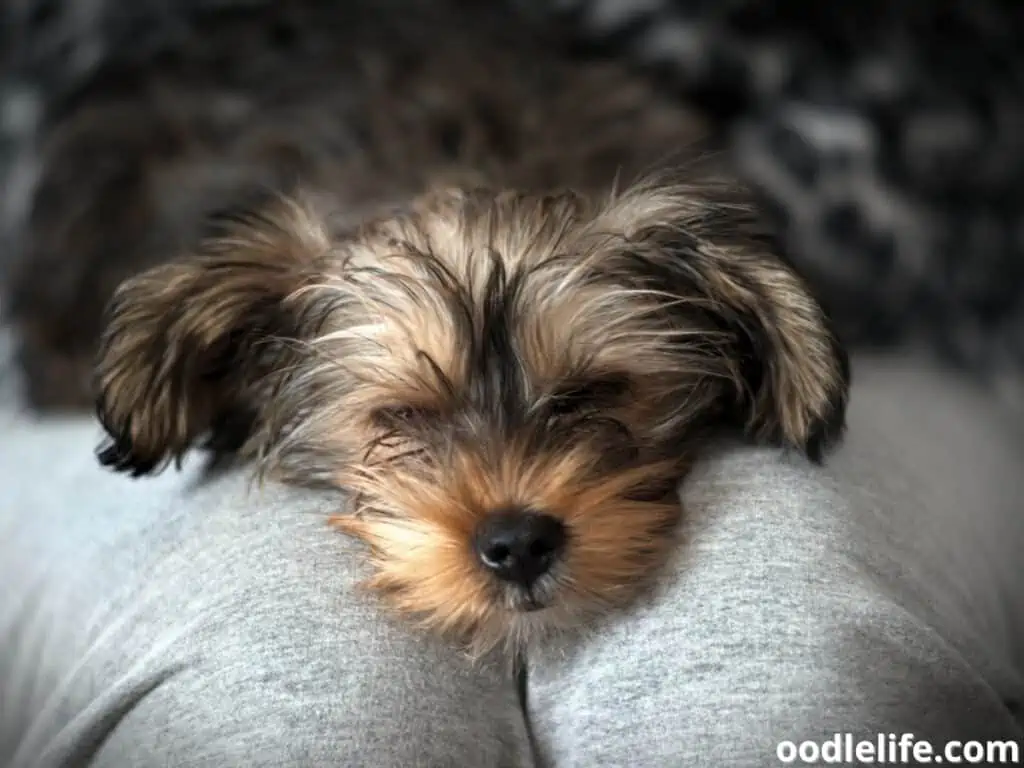
Are Puppies Afraid of the Dark?
If you think this is a silly question to ask, it might interest you to know that it’s one of the questions tons of dog owners are eager to find answers to.
So, are puppies indeed afraid of the dark? Well, yes, some puppies are, but darkness isn’t the root cause of the darkness per day. What causes the fear in the dark are the things or situations your pup has probably attached the dark with.
Some of those situations are as follows:
Separation Anxiety
Separation anxiety occurs when your dog becomes anxious due to being left alone. Many dogs experience this, and this can be very stressful for a dog.
This anxiety can sometimes be instant or grow gradually with hours of separation. It happens to be a coincidence that most people leave their dogs either outside or somewhere in the house different from where they are in the evenings when they’re either settling into bed or going out for the evening or perhaps going to spend the night somewhere else.
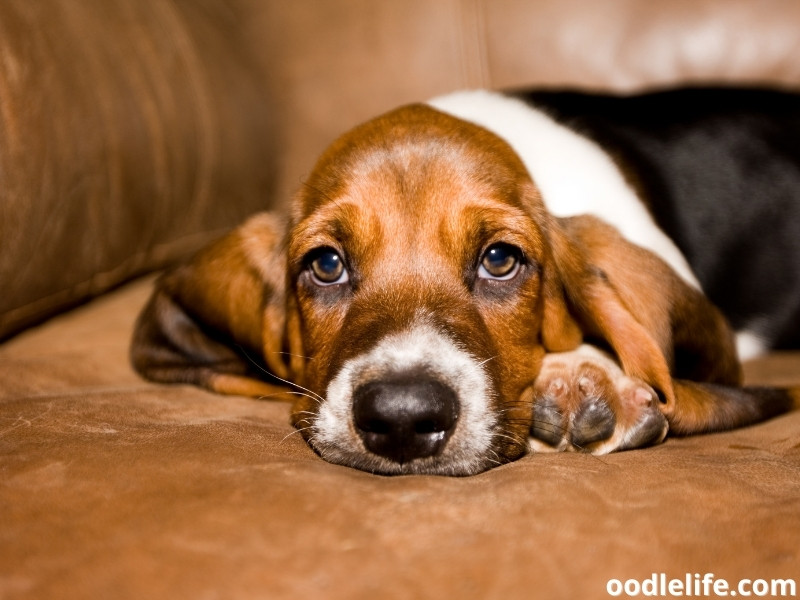
Lack of Vision
Dogs have good night vision. The fact is that they have better vision than we do when it comes to the dark. Unlike humans, dogs have rods that collect dim light and support vision at night.
Dogs (apart from those with blue eyes) have a part of their eye system called the “Tapetum lucidum.” This part is made up of reflective cells and is positioned behind the dog’s retina.
Additionally, these cells imitate a mirror. It reflects any little light that enters the eye. This allows the retina to register it to the dog’s brain.
This increases the dog’s visual sensitivity and enables the dog to detect objects in the dark. The tapetum is also responsible for the glow in a dog’s eye when light is pointed at its face.
Although dogs possess these special eyesight functions, none of these traits is useful in a pitch-black situation. Dogs can’t see anything in a pitch-black environment. This can cause them to become anxious and sometimes scared of the unknown.
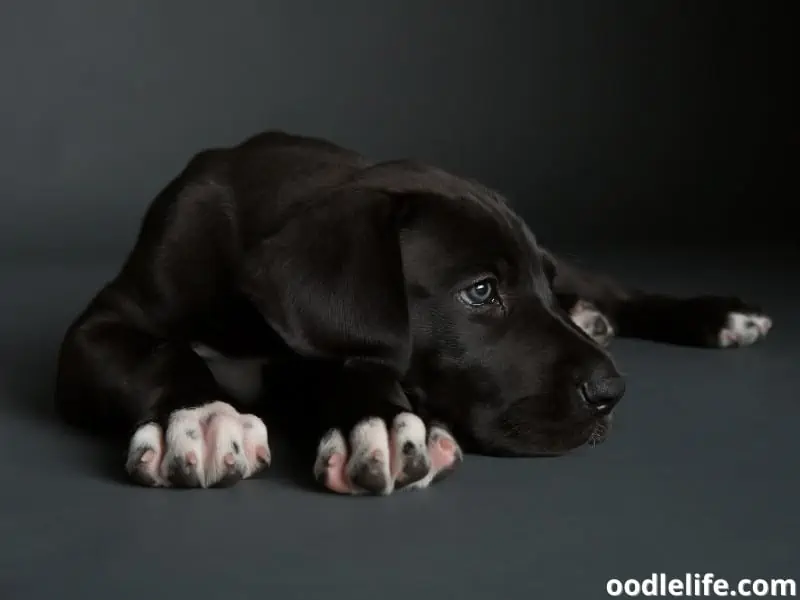
In this kind of situation, the dog feels vulnerable because they can’t see and they feel less able to protect themselves from any external threat.
Humans may be at ease in these circumstances, but your four-legged friend probably has more survival instincts than you do.
In case you were wondering whether or not your dog is afraid of or doesn’t like the dark, here are some of the things you should look out for:
- Your dog always stays in areas where there’s more light at night or comes to you when the light in its room is turned off.
- Your dog is hesitant to go for walks on dark pathways or roads.
- Your dog has its tail tucked between its hind legs and has its ears pointing back in dark areas.
- Your dog moves to random parts of the room when the lights are turned off.
Do Puppies Lose Sleep in Busy Environments?
The answer to this also varies with pups; some sleep better with sounds around them. For some, it may cause overstimulation. For pups like these, you want to ensure the place where they sleep is quiet and dark.
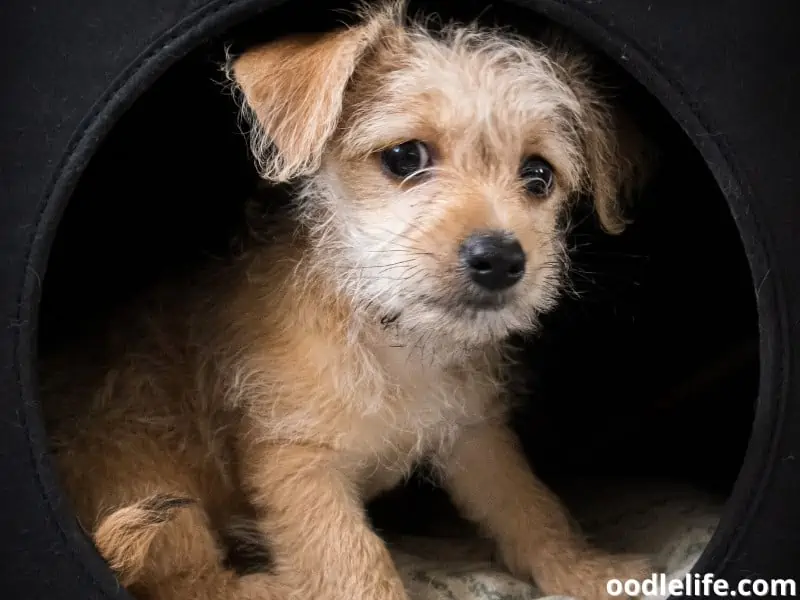
Is It Okay to Leave Puppies in a Dark and Silent Environment?
Well, this depends largely on the dog. As stated earlier, some puppies sleep well with sounds in their environment and some don’t. However, if you notice your dog stays awake and finds it difficult to sleep in a dark and quiet environment, try putting on something with subtle sounds, like a fan or perhaps the radio with a reduced volume.
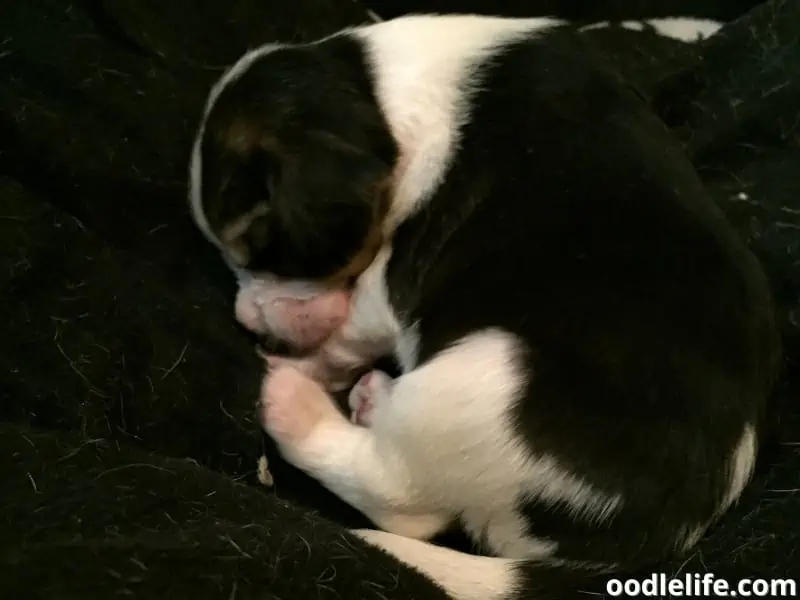
Where is the Safest Place to Keep My Puppy at Night?
It is safe to keep your puppy in a crate (a moderate-sized one) with comfy bedding inside. This helps them sleep comfortably, plus it’s a combo of comfort and safety for your pup. You might want to ask, “Why can’t I toss my puppy under the covers right beside me?”
Well, you can’t, simply because it isn’t safe for your puppy.
Being small and fragile, they can easily be hurt and you can’t be too careful not to roll over them while sleeping, so as much as you love them and want to have them sleep on the same bed as you, consider the safety of their fragile little lives.
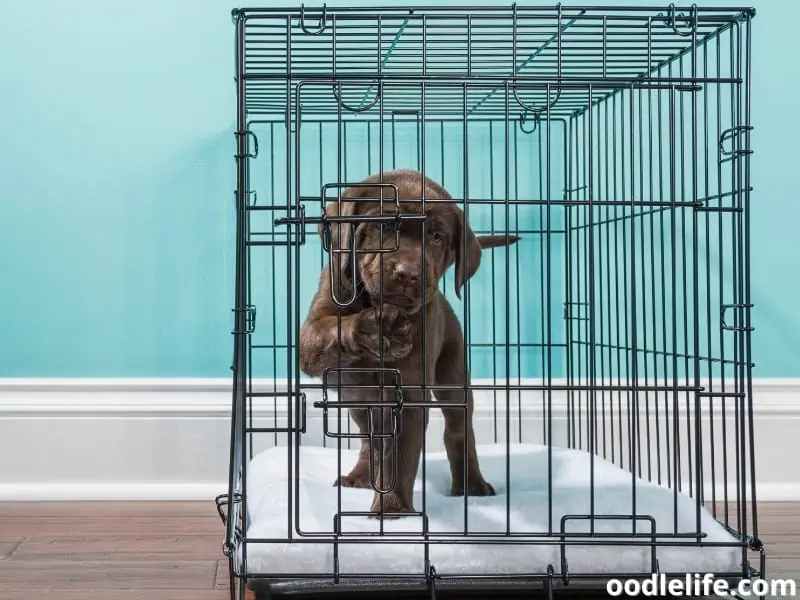
Should My Puppy Have a Bedtime?
Assigning your pup a bedtime seems like the most hilarious thing a ton can do, right? They are not ‘human kids,’ you may say. However, it’s not a bad initiative as it has proven to be an effective tool for house training a puppy.
This simple act allows your puppy to recognize when to settle in for the night and when to quit barking and whining. As an added advantage, it also promotes your dog’s sleeping habits and helps you get the rest you need.
In case you’re wondering, anytime from 8 pm is a good time for your pup, but preferably choose a time when you also go to bed so you both sleep and wake up at the same time or at least at close intervals.
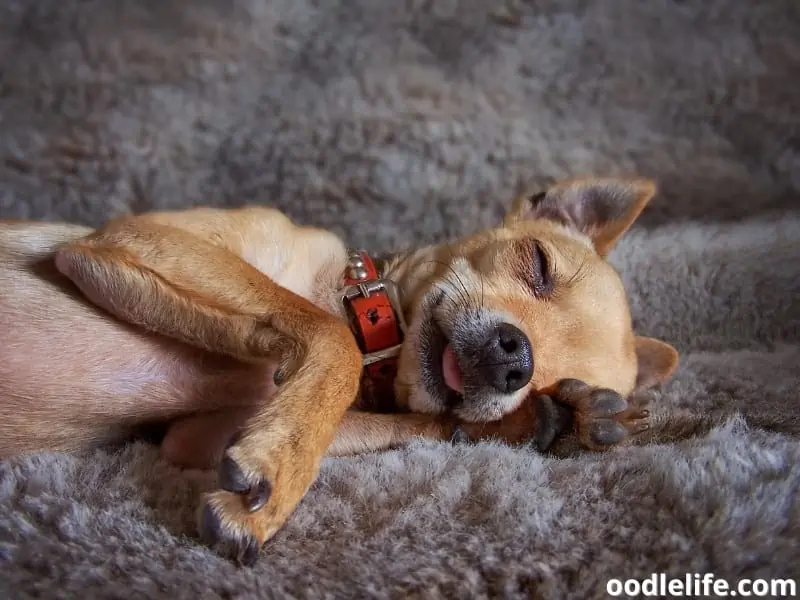
Can I Leave My Puppy Alone in the Dark?
Yes, you can, but doing that isn’t a great idea. Sleeping far from your puppy isn’t much of a good idea either. The first few weeks of your puppy’s life are very sensitive.
Many things could go wrong in the dark, so as much as possible, ensure you are always around. Your presence is one of the things that helps them calm down and feel safer. This also causes them to sleep better.
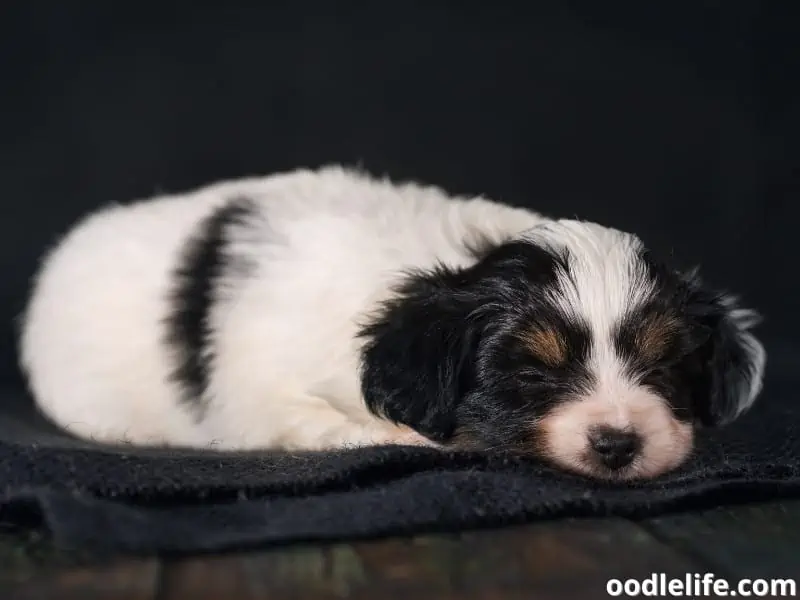
Steps to Help Ease Your Dog’s Anxiety at Night
If one of the reasons for your pup’s being afraid in the dark is anxiety, here are a few steps to help ease that anxiety and help your cute pooch sleep right.
1. Give your dog separation training.
It’s an underestimated value when your dog can stay alone, calm and secure, and if you’ve noticed your dog has separation anxiety, this is a great step for you to take.
This training involves leaving your dog for certain periods, starting with short periods, as small as a few minutes. This is how you can begin. During the day, when you notice your dog is already in a calm state, leave the room and gently shut the door.
Stay in another room for a few minutes before going back to your dog. Repeat this process as often as possible and gradually increase the time you spend away from your dog.
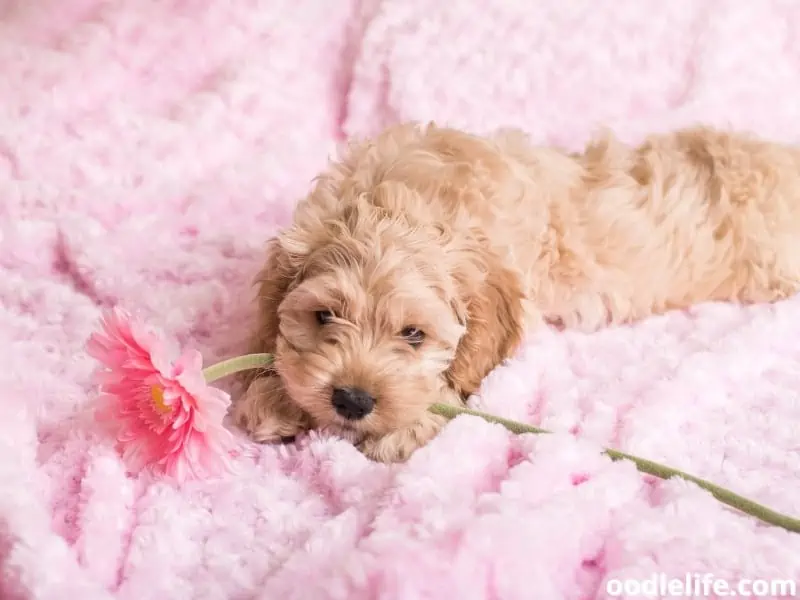
2. Take your dog on evening walks.
Dogs generally need to be exercised, it’s a practice that keeps them healthy. The degree of exercise a dog needs varies with its breed. However, exercising your dog in the evening has its peculiar advantages.
Taking your dog on walks or exercising in the evening helps them burn the excess energy they have, and as this time is closer to bedtime, it helps them sleep better. Also, when dogs are physically tired, they often fall asleep even when they get anxious.
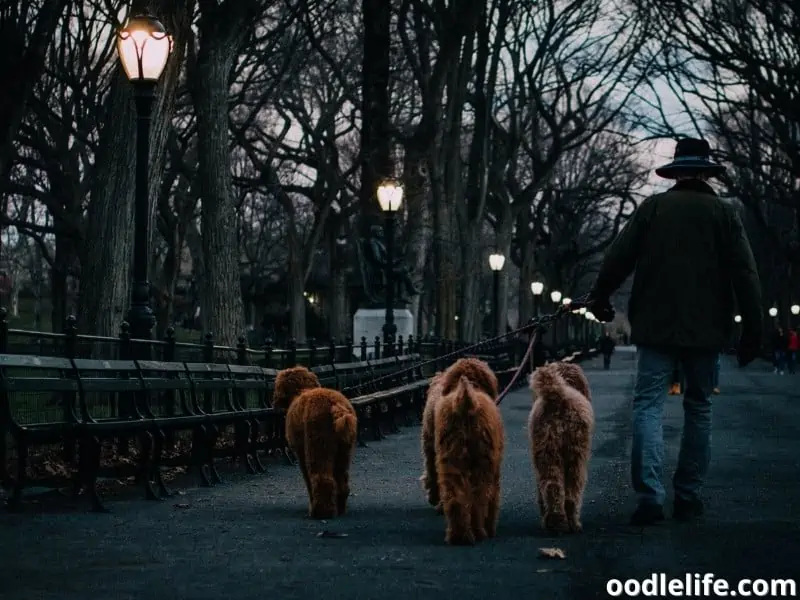
3. Give your dog a scent of you.
Scents work a lot. Give your pup something that has your scent on it, like an old piece of clothing you no longer need. So he knows mommy or daddy will always be around. This helps them relax better and has been proven from experiments.
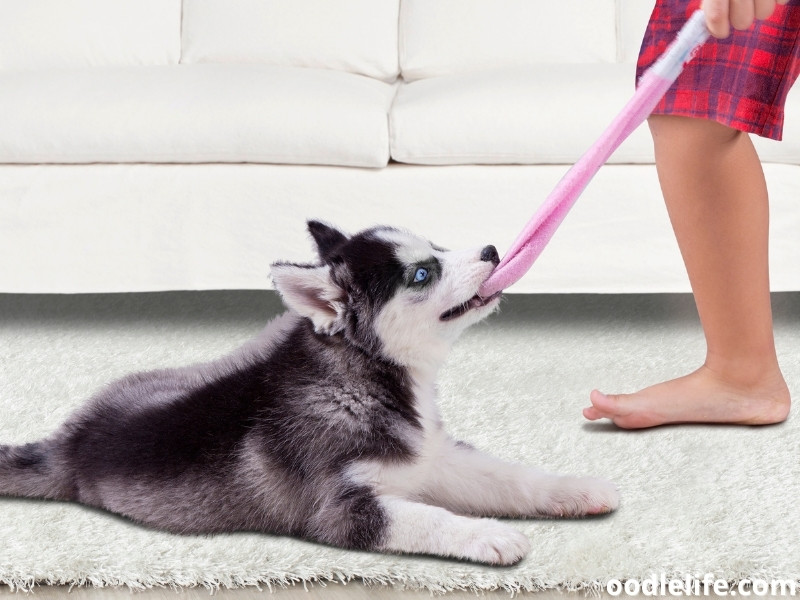
Conclusion
In a nutshell, puppies might not necessarily need darkness to sleep, but they can, unless there are some psychological reasons why they can’t, just like we’ve examined earlier.
In all, do what is best for the latest furry family member to live his best life.
We hope this answers your question.